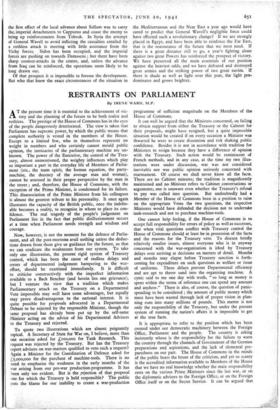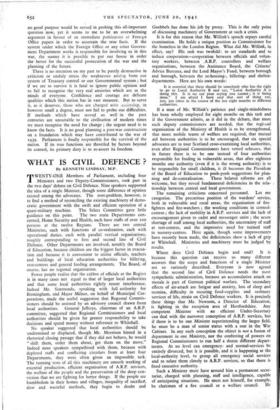RESTRAINTS ON PARLIAMENT
By IRENE WARD, M.P.
AT the present time it is essential to the achievement of vic- tory and the planning of the future to be both realist and ruthless. The prestige of the House of Commons has in the eyes of the people dangerously deteriorated. The view is taken that Parliament has supreme power, by which the public means that complete authority is vested in the members of the House. Except to a limited few, who in themselves represent no weight in numbers and who certainly cannot mould public opinion, the intricacies of the parliamentary machine are un- known. The power of the Executive, the control of the Trea- sury, almost unmentioned, the weighty influences which play so important a part in the everyday life of Members of Parlia- ment (viz., the team spirit, the human equation, the party- machine, the decency of the average man and woman), cannot be assessed in their proper perspective by the man in the street ; and, therefore, the House of Commons, with the exception of the Prime Minister, is condemned for its failure. This disassociation of the Prime Minister from his colleagues is almost the greatest tribute to his personality. It once again illustrates the capacity of the British public, once the indefin- able becomes a reality, to recognise in whom to place its con- fidence. The real tragedy of the people's judgement on Parliament lies in the fact that public disillusionment occurs at a time when Parliament needs strength and wisdom and courage.
Now, however, is not the moment for the defence of Parlia- ment, and all the post-mortems avail nothing unless the deduc- tions drawn from them give us guidance for the future, so that we can eradicate the weaknesses from our system. To take only one illustration, the present rigid system of Treasury control, which has been the cause of endless delays and errors of departmental judgement hampering to the war- effort, should be examined immediately. It is difficult to criticise constructively with the imperfect information available to a Back Bencher (and herein lies one grievance), but I venture the view that a tradition which makes Parliamentary attack on the Treasury on a Departmental Vote impossible may well have some advantages, but equally may prove disadvantageous to the national interest. It is quite possible for proposals advocated in a Departmental Debate to be rejected by the responsible Minister, though the same proposal has already been put up by the self-same Minister acting on the advice of his Departmental Advisers to the Treasury and rejected.
To quote two illustrations which are almost poignantly topical. A Secretary of State for War on, I believe, more than one occasion asked for Lioo,000 for Tank Research. This request was rejected by the Treasury. But has the Treasury expert advisers on war-matters qualified to veto such a request? Again a Minister for the Coordination of Defence asked for £5,000,000 for the purchase of machine-tools. There is no need to emphasise the weakness in the early months of the war arising from our pre-war production-programme. It has been only too evident. But is the rejection of that proposal one for which the Treasury is held responsible? The public puts the blame for our inability to create a war-production programme of sufficient magnitude on the Members of the House of Commons.
It can well be argued that the Ministers concerned, on failing to obtain support from either the Treasury or the Cabinet for their proposals, might have resigned, but a quite impossible situation would be created if on every occasion a Minister was thwarted he were to create dissension and risk shaking public confidence. Besides it is not in accordance with tradition for Ministers to resign because they have a difference of opinion with the Treasury. Such action would be reminiscent of French methods, and in any case, at the time my two illus- trations were under discussion, war was not considered inevitable nor was public opinion seriously concerned with rearmament. Of course we shall never know all the facts. There are no Cabinet minutes; the tradition is magnificently maintained and no Minister refers to Cabinet conversations or arguments; one is unaware even whether the Treasury's refusal to pay was called into question. But undoubtedly had a Member of the House of Commons been in a position to raise on the appropriate Votes the two questions, the respective Ministers would have defended the decision not to undertake tank-research and not to purchase machine-tools.
One cannot help feeling, if the House of Commons is to accept full responsibility for errors of policy as well as successes, that when vital questions conflict with Treasury control the House of Commons should at least be in possession of the facts and the reasons for the Treasury veto. To discuss briefly relatively smaller issues, almost everyone who is in anyway concerned with the war-organisation is irked by Treasury delays over arriving at decisions on matters of detail. Months and months may elapse before Treasury sanction is forth- coming for expenditure on such questions as welfare or issue of uniforms. These delays prevent Departmental efficiency and are apt to throw sand into the organising machine. A cynic said to me one day with truth, " so long as money is spent within the terms of reference one can spend any amount and anyhow." There is also, of course, the question of panic- spending to be considered ; the amount of public money which must have been wasted through lack of proper vision in plan- ning runs into many millions of pounds. This matter is not only the responsibility of the Treasury, but under the present system of running the nation's affairs it is impossible to get at the true facts.
It is appropriate to refer to the position which has been created under our democratic machinery between the Foreign Office, Parliament and the people. The country is asking insistently whose is the responsibility for the failure to warn the country through the channels of Government of the German preparations and aspirations, and the lack of elemental pre- paredness on our part. The House of Commons in the minds of the public bears the brunt of the criticism, and yet so scanty is the accredited information available to Members of the House that we have no real knowledge whether the main responsibility rests on the various Prime Ministers since the last war, or on the diplomatic advisers to the Foreign Office, or on the Foreign Office itself or on the Secret Service. It can be argued that no good purpose would be served in probing this all-important question now, yet it seems to me to be an overwhelming argument in favour of an immediate publication of Foreign Office papers in order to ascertain the true facts. If the system under which the Foreign Office or any other Govern- ment Department works is responsible for involving us in this war, the sooner it is possible to put our house in order the better for the successful prosecution of the war and the planning of the future.
There is no intention on my part to be purely destructive in criticism or unduly stress the weaknesses arising from our system of Treasury control or our Governmental system ; but if we are to survive it is fatal to ignore public opinion and to fail to recognise the very real anxieties which are m the minds of everyone. Confidence and courage are delicate qualities which this nation has in vast measure. But to serve it, as it deserves, those who are charged with ,eaciership, in however small a degree, must not fail to probe our difficulties. If methods which have served us well in the past centuries are unsuitable to the civilisation of modern times we must recognise the need for change ; the urgent need is to know the facts. It is no good planning a post-war construction on a foundation which may have contributed to the war of 1939. Parliament is finally responsible for the survival of the nation. If its true functions are throttled by factors beyond its control, its primary duty is to re-assert its freedom.



























 Previous page
Previous page